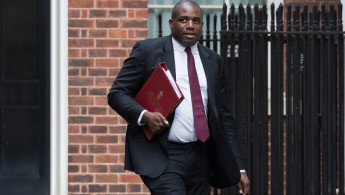UK calls for 'immediate' Gaza ceasefire after Hamas, Hezbollah assassinations
The UK on Wednesday renewed its calls for a ceasefire in Gaza and de-escalation in the region following Israeli strikes which assassinated militant leaders in Lebanon and Iran.
A Tuesday drone strike near Beirut killed senior Hezbollah commander Fouad Shukr, while an Israeli attack on Tehran in the early hours of Wednesday killed Hamas leader Ismail Haniyeh.
They attacks mark a major escalation in the brutal Gaza war which began in October.
"We have seen the reports overnight of the death of Ismail Haniyeh," the UK’s Foreign, Commonwealth and Development Office told The New Arab on Wednesday. "We continue to reiterate that now is the time for de-escalation and an immediate ceasefire in Gaza," said the FCDO.
It came as British Foreign Secretary David Lammy and Defence Minister John Secretary travelled to Qatar "to help drive efforts to end the conflict in Gaza and call for de-escalation in the wider region," the British government said.
Ceasefire talks for Gaza have once again been stalled and will most likely not resume anytime soon after the assassinations.
The talks, being mediated by Qatar, Egypt, and the US are trying to reach a deal between Israel and Hamas which would see an end to hostilities as well as a captive-prisoner swap deal.
"It is absolutely vital that we engage closely with partners like Qatar, who play a key role in mediating the conflict in Gaza so that we can bring this devastating war to an end," Lammy said in a statement.
On Wednesday, only hours before the Israeli drone strike on Beirut’s southern suburb of Haret Hreik that killed Shukr, Lammy had advised British nationals in a video message to leave Lebanon.
Western countries are also trying to end fighting between Hezbollah and the Israeli military on the Lebanon-Israel front, the worst violence between the two sides since 2006.





 Follow the Middle East's top stories in English at The New Arab on Google News
Follow the Middle East's top stories in English at The New Arab on Google News


